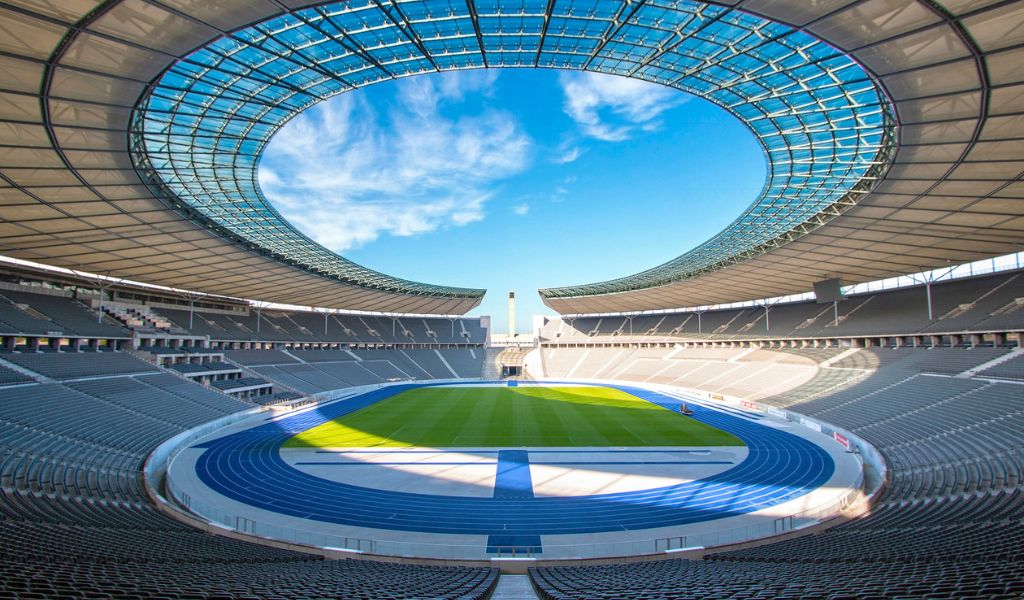
The Olympiastadion Berlin, a symbol of architectural grandeur and historical significance, stands as one of the most iconic sports venues in the world. Situated in the western part of Berlin, Germany, this stadium has witnessed numerous historic events since its inception. Olympiastadion Berlin serves as the home ground for German club Hertha BSC and will host the Uefa Euro 2024 final on Sunday 14 July 2024.
The stadium was originally constructed for the 1936 Summer Olympics, an event overshadowed by the political climate of the time. Designed by architect Werner March, the stadium was a masterpiece of its era, showcasing the grandeur and ambition of the time. The opening ceremony, attended by Adolf Hitler, remains one of the most infamous moments in Olympic history. Despite the dark historical associations, the stadium itself has become a beacon of resilience and sporting excellence.
Major events and memorable moments
Over the decades, Olympiastadion Berlin has hosted a multitude of significant events, solidifying its status as a premier sports venue. Here are some of the key highlights:
- 1936 Summer Olympics: The stadium’s debut event, marking its place in history.
- 2006 Fifa World Cup: Olympiastadion Berlin was one of the key venues, hosting several matches, including the final between Italy and France. This event showcased the stadium’s modern facilities and its capacity to host global sporting events.
- 2009 Athletics World Championships: Usain Bolt’s record-breaking performances in the 100m and 200m sprints were witnessed here, further enhancing the stadium’s legendary status.
- 2015 Uefa Champions League final: The stadium hosted the 2015 UCL final which saw FC Barcelona beat Juventus 3-1.
- Uefa Euro 2024 final: Olympiastadion Berlin hosts six matches during the men’s European Championships, including the final on 14 July.
- DFB-Pokal Finals: The German Cup final is held annually at Olympiastadion.
- Concerts and cultural events: The stadium is also a renowned venue for major concerts, with performances by global icons such as U2, Madonna, and The Rolling Stones.
Renovation in 2004
The most significant renovation of the Olympiastadion Berlin occurred between 2000 and 2004. This extensive project, costing approximately €242m, aimed to modernise the stadium while preserving its historical essence. The renovation successfully transformed Olympiastadion into a state-of-the-art facility capable of hosting major international events while retaining its historical charm. Key aspects of the renovation included:
- New roof: A lightweight, translucent roof was added, covering all the seating areas while allowing natural light to penetrate the stadium. This design improved both the aesthetic appeal and the comfort of spectators.
- Seating and accessibility: The seating arrangements were reconfigured to provide better sightlines and increased comfort. Accessibility was also improved, with enhanced facilities for disabled spectators.
- Track and field: A new blue running track was installed, replacing the old track. This feature has become one of the stadium’s distinctive characteristics.
- Infrastructure upgrades: The renovation included upgrading the stadium’s infrastructure, such as new lighting systems, modernised restrooms, expanded VIP areas, and upgraded media facilities.
- Historical preservation: While modernising the stadium, great care was taken to preserve its historical elements, ensuring that the renovated stadium remained true to its original design.
Capacity and facilities
The Olympiastadion Berlin boasts a seating capacity of approximately 74,475, making it one of the largest stadiums in Germany. The renovated facilities ensure a comfortable and enjoyable experience for spectators, with modern amenities, VIP lounges, press areas, and hospitality suites. Guided tours can be booked at olympiastadion.berlin
Architectural and cultural significance
Architecturally, the Olympiastadion is a blend of historical and modern elements. The original design reflects the grandeur of the 1930s, while the renovations have seamlessly integrated contemporary features. The stadium’s imposing façade, combined with its lush surroundings, creates a striking visual impression.
Culturally, the stadium has transcended its original purpose, becoming a symbol of Berlin’s resilience and transformation. From its controversial beginnings to its current status as a hub of sports and entertainment, Olympiastadion Berlin encapsulates the spirit of a city that has continually reinvented itself.
Image: Martijn Mureau, CC BY-SA 4.0, via Wikimedia Commons
